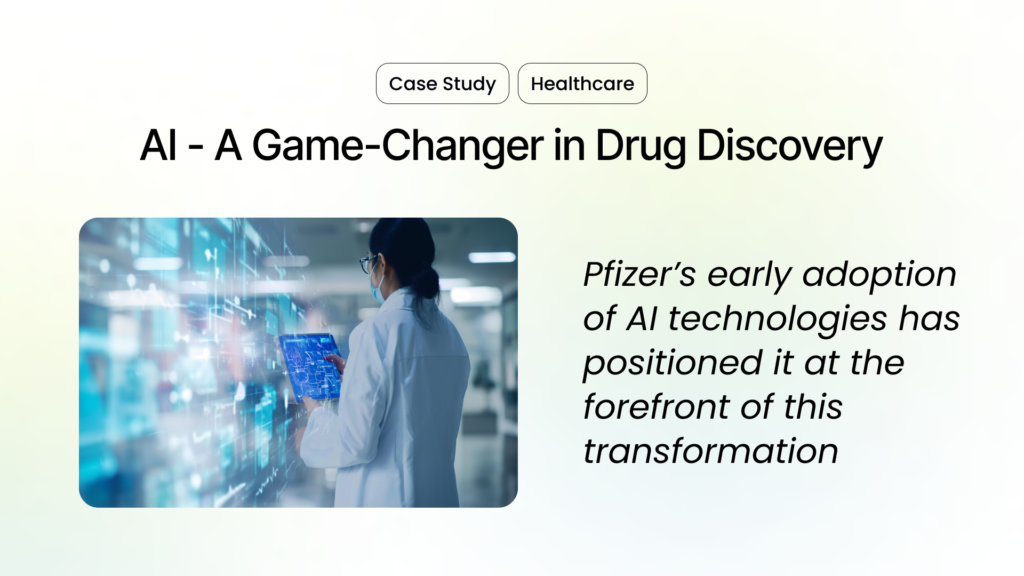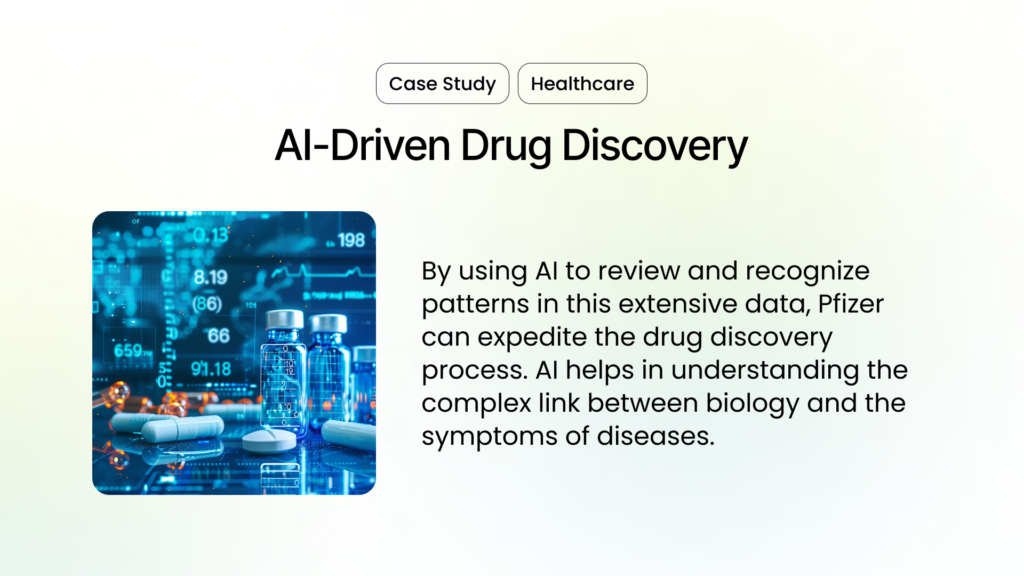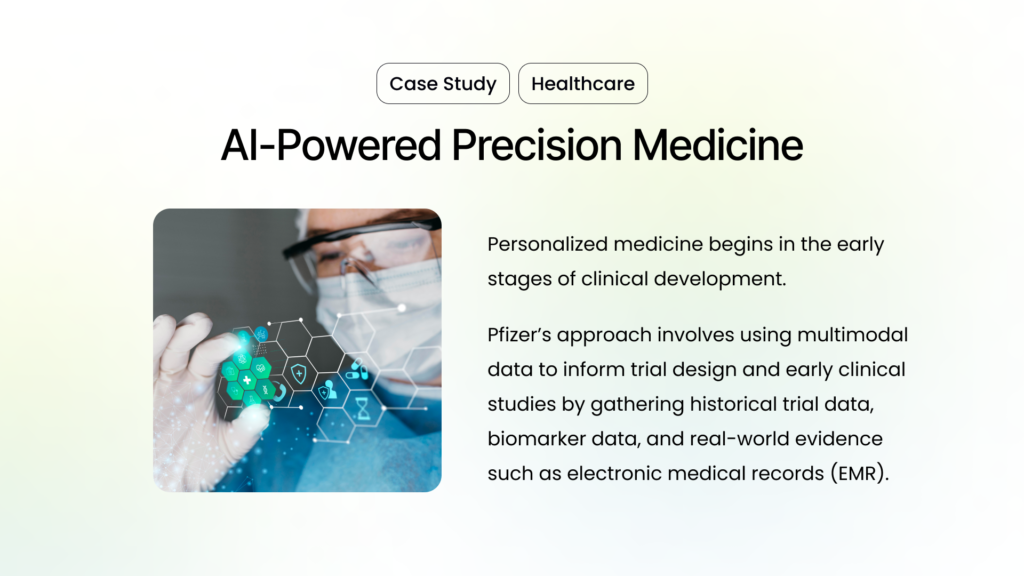In the ever-evolving landscape of healthcare, Pfizer stands as a beacon of innovation, leveraging AI to revolutionize the drug development process. The journey from drug discovery to FDA approval is traditionally fraught with challenges, leading to lengthy and costly development timelines. However, Pfizer’s integration of AI into its processes is changing the game, making drug development faster, more efficient, and more precise.
The Traditional Challenges of Drug Development
Drug discovery and formulation have long been plagued by significant challenges, resulting in prolonged and expensive development processes. Traditional methods often rely on a hit-or-miss approach, where serendipity plays a major role in finding viable drug candidates. This inefficiency is starkly highlighted by the fact that only 12% of drugs successfully progress from phase-1 clinical trials to FDA approval. The process is not only slow but also costly, often requiring billions of dollars in investment.
AI – A Game-Changer in Drug Discovery
The advent of AI in healthcare is set to transform this landscape, and Pfizer is leading the charge. AI’s ability to analyze vast datasets and recognize patterns far exceeds human capabilities, making it an invaluable tool in drug discovery. Machine learning (ML) and natural language processing (NLP), key components of AI, enable rapid and precise analysis of data, accelerating the identification of promising drug candidates.

Pfizer’s early adoption of AI technologies has positioned it at the forefront of this transformation. Since 2014, Pfizer has been leveraging AI in pharmacovigilance, utilizing data to gain deeper insights into diseases and understand how different patient populations respond to various therapies. This early recognition of AI’s potential has paved the way for more extensive applications in drug discovery and development.
AI-Driven Drug Discovery
AI is a blanket term encompassing various advanced computing techniques. For a pharma giant like Pfizer, machine learning and NLP are particularly critical.
Machine learning enables systems to learn and perform tasks faster than humans, handling vast amounts of data generated during drug testing. This data includes both public and proprietary datasets, which can run into petabytes, making traditional data analysis methods inadequate.
By using AI to review and recognize patterns in this extensive data, Pfizer can expedite the drug discovery process. AI helps in understanding the complex link between biology and the symptoms of diseases.
For instance, a drug targeting the biomechanisms of arthritis may not necessarily yield the same results for joint inflammation. AI helps decipher these nuances, ensuring more targeted and effective treatments.

AI-Powered Precision Medicine
The medical community has long aspired to personalize medicine. Given that every individual has a unique genetic makeup, the existing one-size-fits-all drug delivery paradigm is often inefficient. AI is crucial in this quest for personalized medicine, and Pfizer is at the forefront of this revolution.

At its Machine Learning Research Hub, Pfizer applies both classical and deep learning techniques to these datasets. This approach yields valuable insights into each patient subpopulation, allowing for the identification of groups that may respond better to specific treatments. Consequently, Pfizer can personalize drug delivery, reducing the likelihood of side effects and enhancing treatment efficacy.
Pfizer and Tempus: A Partnership for Precision
In a bid to elevate its personalization efforts, Pfizer partnered with Tempus, an AI-powered precision medicine company. This collaboration aims to integrate advanced AI analytics into Pfizer’s drug development processes, further refining the ability to deliver tailored treatments to patients.
However, the adoption of AI in personalized medicine is not without challenges. One major concern is privacy. Collecting and analyzing sensitive patient data raises significant privacy issues, especially in the event of data breaches. Pfizer addresses this by embedding robust privacy policies into its AI practices.
The company adheres to three core principles for AI in healthcare, one of which is respecting individual privacy. This includes informing patients about data usage and ensuring transparency in AI systems, thereby fostering trust and advancing personalized medicine.
The Future of AI in Drug Development
Despite the remarkable advancements in AI, we are only scratching the surface of its potential. Emerging technologies like generative AI promise even more radical innovations in healthcare. Pfizer’s proactive adoption and integration of AI signify a broader shift in the industry, underscoring the importance of staying ahead of technological trends.
Pfizer’s success in leveraging AI for drug development not only accelerates the process but also sets a benchmark for the industry. It sends a clear message to other healthcare organizations about the necessity of adopting AI to remain competitive. The cautionary tales of Kodak, Blockbuster, and Blackberry, which failed to adapt to disruptive technologies, serve as stark reminders of the importance of innovation.
The bottom line
Pfizer’s journey in harnessing AI for accelerating drug development underscores a transformative shift in the healthcare industry. By integrating AI into its processes, Pfizer has significantly reduced the time and cost associated with bringing new drugs to market. AI’s ability to analyze vast datasets, predict outcomes, and personalize treatments holds immense promise for the future of healthcare.
Key Takeaways
- Technology Integration: Advanced algorithms, machine learning, and natural language processing are essential for efficient drug discovery and personalized medicine. Pfizer’s AI initiatives leverage these technologies to stay at the forefront of innovation.
- Precision Medicine: AI enables the customization of treatments based on individual genetic profiles and clinical data, leading to more effective and safer therapies.
- Privacy and Transparency: Ensuring robust privacy policies and transparency in AI systems is crucial for gaining patient trust and advancing personalized medicine.
- Future Trends: The continued evolution of AI, including generative AI, will drive further innovations in drug development and healthcare.
Pfizer’s success story highlights the transformative potential of AI in healthcare. By embracing AI, Pfizer is not only revolutionizing drug development but also paving the way for more personalized, efficient, and effective treatments. As AI technology continues to evolve, the possibilities for innovation in healthcare are boundless, promising a future where medical advancements are achieved at unprecedented speed and precision.






